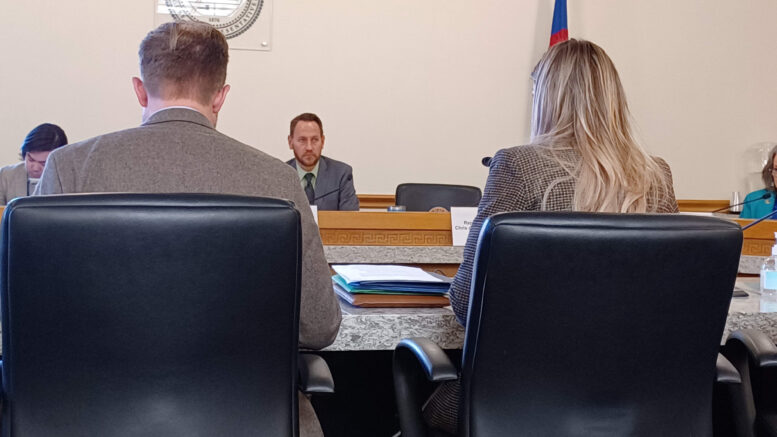Gov. Jared Polis’ focus on bringing down pharmaceutical prices has spawned an effort to limit what pharmacy benefit managers can charge to business customers — an effort that is dividing business groups and legislators over whether it will be helpful or intrusive to employers.
House Bill 1201, sponsored by Democratic Rep. Lindsey Daugherty of Arvada and Republican Rep. Matt Soper of Delta, would require that PBMs charge no more to health-plan customers for the drugs they purchase than they pay to the pharmacies supplying them. The bill, which advanced out of the House Health and Insurance Committee on a 10-1 vote Friday, is just the latest effort from the administration of the Democratic governor to try to halt the rise in prescription-drug prices.
In 2021, the Legislature created the Prescription Drug Affordability Board to examine the prices of some drugs and set an upper limit on costs for them in this state — a board whose powers Democrats are looking to expand in a new bill that’s set for an upcoming House debate. Then last year, the Legislature required that any rebates offered by drug manufacturers to purchasers like PBMs be passed along to consumers to lower their costs rather than kept by the purchasers to boost their profits.
In some senses, HB 1201 is an extension of that 2022 law, mandating that whatever PBMs charge to insurers and their customers for the cost of prescription drugs must be equal to what the organizations pay to pharmacies for those drugs. Currently, PBMs are allowed to reimburse pharmacies less than the amount they are charging health plans, but Colorado is looking to join six other states that already have outlawed that practice.
Reasons for the bill
Kim Bimestefer, executive director of the Colorado Department of Health Care Policy and Financing, said the practice has led to PBMs overcharging Medicaid by an average of 10% and overcharging small businesses by an average of 19% versus what they pay pharmacies. The practice of using what is called “spread pricing” led to insurance giant Centene agreeing to pay a $900 million settlement to 17 state Medicaid programs that paid more for prescription drugs than it cost the company to buy them, she noted.
HB 1201 would ban spread pricing involving Medicaid and small-business plans that are regulated by the Colorado Division of Insurance, and it would require PBMs to provide transparent data to insurers, employers and pharmacies on what it charges and pays for drugs. Another bill that recently passed its first legislative committee on a bipartisan vote, HB 1227, would require PBMs and health insurers that use PBMs to pay a fee to the Colorado Division of Insurance that would fund its costs of enforcing requirements and prohibitions on PBMs.
Soper and other supporters pushed the bill as one that will lower insurance costs for employers and allow them to reinvest that money in employee salaries or other expenses. Noting that the three PBMs that control 80% of the national market are owned or operated by insurers, Peak Health Alliance CEO Anne Ladd called spread pricing an “insidious practice that drives up premiums” while it allows both PBMs and insurers to increase profits.

Colorado state Reps. Lindsey Daugherty and Matt Soper present their bill on PBM regulation to a House committee on Friday.
“Health care costs are rising, and we are trying to do whatever we can to make sure we don’t continue with that,” Daugherty said, referencing a statement from Bimestefer that prescription drugs are the “biggest driver” for increasing costs.
Business concerns
Business groups, including the Colorado Chamber of Commerce and the Colorado Competitive Council, negotiated an amendment that was added to the bill Friday exempting ERISA plans that are used by large national employers and by companies that self-fund their insurance. Companies using those plans still can opt into the transparency and regulations afforded by HB 1201, but some business groups have said they want to maintain the ability to continue with spread pricing, which can be employed as a tactic in pricing negotiations with insurers.
Meghan Dollar, senior vice president of governmental affairs for the Colorado Chamber, said her organization is likely to drop its opposition to the proposal and go neutral with the ERISA amendment included on the bill. Colorado insurance regulators don’t currently have oversight of ERISA plans, which are federally regulated.
Rep. Ron Weinberg, R-Loveland, cast the only “no” vote against HB 1201 because he didn’t like the idea of government inserting itself into private-sector contracts.
“I have a deep concern that this is direct interference from government into a private entity,” Weinberg told the sponsors. “When you start getting government interference with prices, you get a little bit dicey.”
Meanwhile, Rep. Ryan Armagost, R-Brighton, said that he was swayed to vote for the bill specifically because of the benefits it could offer to local businesses and their employees.
More than 50% of Coloradans get their insurance through their employer, noted Isabel Cruz, policy director for the Colorado Consumer Health Initiative. Because of that, the new law, if passed, could prove a valuable tool as the state continues to look at different ways to stop cost escalations in health care, she said.
